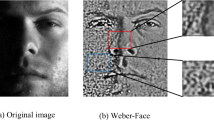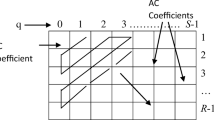Abstract
For the robust face detection, illumination is considered as one of the great challenges. Motivated with the adaptation of the human vision system, we propose the curve mapping (CM) function to adjust the illumination conditions of the images. The lighting parameter of CM function is determined by the intensity distribution of the images. Therefore the CM function can adjust the images according to their own illumination conditions adaptively. The CM method will abandon no information of the original images and bring no noises to the images. But it will enhance the details of the images and adjust the images to the proper brightness. Consequently the CM method will make the images more discriminative. Experimental results show that it can improve the performance of the face detection with the CM method as a lighting-filter.
Preview
Unable to display preview. Download preview PDF.
Similar content being viewed by others
References
Rowley, H.A., Baluja, S., Kanade, T.: Neural network-based face detection. IEEE Transactions on Pattern Analysis and Machine Intelligence 20(1), 22–38 (1998)
Schneiderman, H., Kanade, T.: A Statistical Method for 3D Object Detection Applied to Faces and Cars. In: Proc. IEEE Conf. on Computer Vision and Pattern Recognition (2000)
Li, S.Z., Zhu, L., Zhang, Z.Q., et al.: Statistical Learning of Multi-View Face Detection. In: Proc. of the 7th European Conf. on Computer Vision (2002)
Adini, Y., Moses, Y., Ullman, S.: Face recognition: the problem of compensating for changes in illumination direction. IEEE Tran. Pattern Recognition and Machine Intelligence 19(7), 721–732 (1997)
Shashua, A., Riklin-Raviv, T.: The Quotient Images: Class-based Re-Rendering and Recognition with Varying Illuminations. IEEE Tran. Pattern Recognition and Machine Intelligence 23(2), 129–139 (2001)
Wang, H., Li, S.Z., Wang, Y.: Generalized quotient image. In: IEEE Conference on Computer Vision and Pattern Recognition (2004)
Belhumeur, P., Kriegman, D.: What is the set of images of an object under all possible lighting conditions? In: IEEE Conf. Computer Vision and Pattern Recognition, pp. 270–277 (1996)
Georghiads, A., Belhumeur, P., Kriegman, D.: From few to many: illumination cone models for face recognition under variable lighting and pose. IEEE Tran. Pattern Recognition and Machine Intelligence 23(6), 643–660 (2001)
Ramamoorith, R., Hanrahan, P.: A signal-processing framework for inverse rendering. In: SIGGRAPH, pp. 117–128 (2001)
Basri, R., Jacobs, D.: Lambertian reflectance and linear subspace. IEEE Tran. Pattern Analysis and Machine Intelligence 25(2), 218–233 (2003)
Ferwerda, J.A., Pattanaik, S.N., Shirley, P., Greenberg, D.P.: A model of visual adaptation for realistic image synthesis. In: Proceedings of the 23rd annual conference on Computer graphics and interactive techniques (1998)
Reinhard, E., Stark, M., Shirly, P., Ferwerda, J.: Photographic tone reproduction for digital images. ACM Transactions on Graphics 21(3), 267–276 (2002)
Xiao, R., Li, M., Zhang, H.: Robust multipose face detection in Images. IEEE trans. on Circuits and Systems for video technology 12(1), 31–41 (2004)
Sim, T., Baker, S., Bsat, M.: The CMU Pose, Illumination, and expression (PIE) database. In: Processing of the IEEE International Conference on Automatic Face and Gesture Recognition (2002)
Martinez, A.M., Benavente, R.: The AR Face Database. CVC Technical Report #24 (1998)
Phillips, P.J., Wechsler, H., Huang, J., Rauss, P.J.: The FERET database and evaluation procedure for face-recognition algorithms. Image and Vision Computing 16(5), 295–306 (1998)
Author information
Authors and Affiliations
Editor information
Editors and Affiliations
Rights and permissions
Copyright information
© 2006 Springer-Verlag Berlin Heidelberg
About this paper
Cite this paper
Jiang, X., Zhao, T., Zhao, R. (2006). Curve Mapping Based Illumination Adjustment for Face Detection. In: Blanc-Talon, J., Philips, W., Popescu, D., Scheunders, P. (eds) Advanced Concepts for Intelligent Vision Systems. ACIVS 2006. Lecture Notes in Computer Science, vol 4179. Springer, Berlin, Heidelberg. https://doi.org/10.1007/11864349_63
Download citation
DOI: https://doi.org/10.1007/11864349_63
Publisher Name: Springer, Berlin, Heidelberg
Print ISBN: 978-3-540-44630-9
Online ISBN: 978-3-540-44632-3
eBook Packages: Computer ScienceComputer Science (R0)




